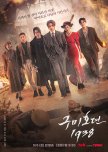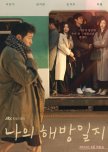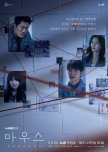
⚔️ Unbreakable Bonds and Unforgettable Friendships: A 'Fox'-ceptional Sequel
It's rare for a second season to surpass the first, let alone do it in a way that doesn't compromise the canon set up by the original. Tale of the Nine Tailed 1938 does this exceptionally well. It manages to retain all the elements that made season one great: flawed. complex and intriguing main characters (Lee Yeon and Lee Rang) and their wounded but unbreakable bond, the rich fantasy world-building, and the deeply interwoven native folklores. However, it surpasses the original with improved pacing, a tighter plot, and significantly better villains and backstory.The original's biggest flaw was a weak villain and the vague backstory of FL's parents, which left us with unanswered questions and plot holes. With 1938, the villains are more coherent, although we are still left with some unanswered questions regarding one of them (presumably to be addressed in the third season?). The backstory of the villains is better fleshed out, adding to the compelling threat they pose. Despite being a fantasy where the outcome is fairly assured, the series manages to raise the stakes against our heroes and presents them with a daunting task.
Much of the enjoyment comes from the excellent chemistry between the characters. Beyond the remarkable camaraderie between the Lee brothers, the fellowship among the Mountain god trio is equally engaging. The humour is on point, with comedic situations and witty dialogue. The tone seamlessly shifts between humor and intrigue, poignant and thrilling. No moment is wasted, and even side characters and their stories are well-integrated into the overarching narrative.
I must admit that some of the flaws from the writer are still present in this season, mainly a tendency to leave a trail of apparent plot holes. While it's slightly less overt in season 2, it remains noticeable. In season 1, it mainly revolved around the parents' storyline and the reincarnation concept. In season 2, the lack of clear discussion over Moo Young's brother's atrocities is a glaring plot hole, especially considering the flashback showing him attacking Moo Young himself. It could have been addressed with a scene that demonstrates why Moo Young is confident in his brother's innocence.
The one main flaw of S1 was Lee Yeon and Ji Ah's relationship. It was perhaps a combination of weak writing (it relied too heavily on her past self rather than developing the relationship with the present character) and a lack of chemistry between them. (That being said, I was still able to enjoy their relationship because LDW is just that adorable.) S2 is better precisely because it stays true to S1, our nine-tailed fox loves for life, so his chemistry with Hong Joo make for an uncomplicated, witty and enjoyable friendship. Kim So Yeon steals every scene she's in, exhibiting great chemistry with all her co-stars. The treat was seeing Lee Rang's love story, although his surprise power raises more questions that will hopefully be addressed in Season 3.
As someone who was initially wary of a sequel, I was amazed by the quality of this season and now find myself longing for Season 3.
9.5/10
Was this review helpful to you?

An honest yet hopeful introspective slice of life.
"Great art is clear thinking about mixed feelings."— W. H. Auden
The quote sums up what makes this drama so good. The tangled ball of yarn that resides in all of us, that we spend decades trying to unravel in order to knit a beautiful tapestry that is our life. At times it just feels like you're strangling the knots, this drama is what happens when you give yourself time to disentangle.
I feel a little conflicted about the finale, holistically it's a beautiful drama I'd recommend, one of the few slice-of-life I could rewatch. The writer does overplay her hand at times and the finale got a little overly maudlin for me. It is however a drama that does exactly what it set out to do, meditate on the ways we approach life's uncertainties and how we are as much imprisoned by our own attitude as much as our environment. The journey of liberation for each of the characters is equal parts poignant and frustrating. The ending is both realistic and hopeful and ties in well with the theme, that we are liberated when we find the courage to love ourselves as much as others unconditionally. I began this for Gu and Mi Jung, found myself relating to Ki Jung mid-way, and stayed for Chang Hee.
Was this review helpful to you?

A Feast for the Eyes
Netflix new food travelogue "A Nation of Broth" is a journey around South Korea savouring the rich varieties of broths, soups and stews. We get to learn a little about the history of these soups, the cultural practices that shaped and were shaped by these dishes and the labour involved in making them. The historical anecdotes are interwoven with the charming banter between the hosting trio making for a light and relaxing watch.Guk, Tang, Jjigae, Jeongol, Suk, Po, with many different types of soups, they have one for every occasion, a cold winter's night? a hangover? just gave birth? celebrating the New Year? As one of the host said, Koreans have broth in their veins and that probably because it's very much the backbone of their cuisine. Many of the recipes have been passed down for generations and the cooks have perfected their art over decades. We get to see how history is preserved through the food traditions in the different locales, while also seeing how some have been adapted with a modern twist.
It was charming and informative. Have a packet of ramyeon on stand by as you're guaranteed to be craving for some Korean broth minutes into the show.
“A meal without soup is like a face without eyes.”
Early 20th century Korean culinary book, Joseon·mussang·sinsik·yorijebup, qtd. in Episode 2.
Was this review helpful to you?

This review may contain spoilers
A Psychological Thriller of Redemption
"No man can walk so long in the shadow that he cannot come again to the light."— Robert Jordan
It's been a long time since a drama made me feel so much. I feel drained, literally because I'm sleep deprived having binged this in 3 days while keeping up with work. Emotionally and mentally too because this was a well written drama that explored some scary ideas about the human condition through an intriguing thought experiment. The question isn't new, it's been around since the mid-1800s when Francis Galton coined the phrase "nature vs nurture" in a discussion about the influence of heredity and environment but history has shown us that our tragic flaw has been our ability to rationalise violence under the guise of humanity. Popular science fiction films like Gattaca and Minority Report had similar themes of free will vs. self determination, but what I think this drama does better is it's ability to demonstrate the nuances and implication of the debate and the various manifestations of our hubris through a very raw examination of how our humanity is nurtured, tested and proven in the way we experience pain, guilt and forgiveness.
I really liked Ba Reum's trajectory and ending. His emotional and spiritual journey was heart wrenching and Lee Seung-Gi did an excellent job of terrifying me one moment and making me weep for him the next. That ending, "He died in extreme pain as he repented for his sins. Did the deity do that to punish him or to save him?" I really love it not only because we see him get a redemptive arc and finally at peace with himself and with God but this idea that even "monsters" are extended grace is a challenging concept to accept spiritually but reflects an important characteristic of unconditional love.
Lee Hee-Joon's portrayal of his character's vengeful anger cloaking grief and shame was really well done. I really like how it explored his journey of forgiveness, learning to forgive himself and those who've wronged him. Forgiving is hard, but not forgiving hurts us even more.
At almost every critical moment we will see people given very similar choices make very different decisions, and what this writer did so well was you could genuinely understand where they were all coming from. Ironically this is also where I feel she dropped the ball with the ending. Specifically by having the people vote in favour for the abortion of foetus with the "psychopath gene" and the bill passing, while a realistic outcome, seems to undermine some of the thematic ideas being challenged through the narrative, made even worse by the idea that the schemer behind this devastating plot got what she desired - to see the bill passed and society enforcing a very dangerous doctrine.
On a lighter note, did you know that South Korea has a population of 51 million people and half of them are in this drama? And by the 4th episode a quarter of them are dead. I challenge anyone to find a historical with this many characters and deaths. The key difference here is unlike wuxia's and sageuk's where you can usually just go with the flow until things fall into place, this is one drama you do need to pay attention to every character's connection to get the most out of it.
Also somebody please cast Kwon Hwa-Woon in a rom-com, my shallow ass couldn't stop thinking what a cutie he was even while I thought he was a psychopathic killer.
Thanks to @Joerin who got me intrigued about this drama and @TheButterfly whose post got me motivated to start it.
Was this review helpful to you?

 18
18 38
38 3
3






















